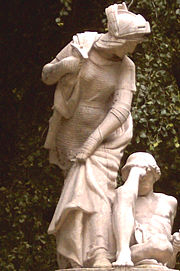78.61.230.14 (talk) No edit summary |
78.56.121.167 (talk) No edit summary |
||
| Line 15: | Line 15: | ||
'''''Grażyna''''' is an 1823 [[narrative poem]] by [[Adam Mickiewicz]], written in the summer of 1822 during a year-long sabbatical in Vilnius, while away from his teaching duties in [[Kowno]] (present day Kaunas).<ref name="RRK">Roman Robert Koropeckyj, [https://books.google.com/books?id=Pq1KOMGz2yUC&pg=PA35&dq=gra%C5%BCyna+by+mickiewicz&hl=en&ei=d6ObToawMobY0QHzroXEBA&sa=X&oi=book_result&ct=book-preview-link&resnum=6&sqi=2&ved=0CEYQuwUwBQ#v=onepage&q=gra%C5%BCyna%20by%20mickiewicz&f=false ''Adam Mickiewicz: the life of a romantic''.] ''[[Cornell University Press]]'', 2008. Page 35. {{ISBN|0-8014-4471-3}}.</ref> Probably his first notable work. |
'''''Grażyna''''' is an 1823 [[narrative poem]] by [[Adam Mickiewicz]], written in the summer of 1822 during a year-long sabbatical in Vilnius, while away from his teaching duties in [[Kowno]] (present day Kaunas).<ref name="RRK">Roman Robert Koropeckyj, [https://books.google.com/books?id=Pq1KOMGz2yUC&pg=PA35&dq=gra%C5%BCyna+by+mickiewicz&hl=en&ei=d6ObToawMobY0QHzroXEBA&sa=X&oi=book_result&ct=book-preview-link&resnum=6&sqi=2&ved=0CEYQuwUwBQ#v=onepage&q=gra%C5%BCyna%20by%20mickiewicz&f=false ''Adam Mickiewicz: the life of a romantic''.] ''[[Cornell University Press]]'', 2008. Page 35. {{ISBN|0-8014-4471-3}}.</ref> Probably his first notable work. |
||
The poem describes the exploits of a [[mythical]] [[Lithuanians|Lithuanian]] chieftainess Grażyna ({{lang-lt|Gražina}}) against the forces of the medieval Order of the [[Teutonic Knights]]. The woman character is believed to have been based on Mickiewicz's own sweetheart from Kowno, Karolina Kowalska. The name was originally conceived by Mickiewicz himself, having used the [[Root (linguistics)|root]] of the [[Lithuanian adjective]] '' |
The poem describes the exploits of a [[mythical]] [[Lithuanians|Lithuanian]] chieftainess Grażyna ({{lang-lt|Gražina}}) against the forces of the medieval Order of the [[Teutonic Knights]]. The woman character is believed to have been based on Mickiewicz's own sweetheart from Kowno, Karolina Kowalska. The name was originally conceived by Mickiewicz himself, having used the [[Root (linguistics)|root]] of the [[Lithuanian adjective]] ''graži'', meaning "beautiful".<ref name=calend>[http://kalendarz.pwn.pl/dzien.php?y=2007&m=4&d=1 April 1], a name-day for Grażyna, #53 in Poland among the most popular names {{pl icon}}</ref> |
||
It was said by Polish writer [[Christien Ostrowski]] to have inspired [[Emilia Plater]], a military heroine of the [[November Uprising|November 1830 Uprising]]. |
It was said by Polish writer [[Christien Ostrowski]] to have inspired [[Emilia Plater]], a military heroine of the [[November Uprising|November 1830 Uprising]]. |
||
Revision as of 11:59, 20 November 2018
 Grażyna marble statue based on poem by Adam Mickiewicz, Planty Park, Kraków | |
| Author | Adam Mickiewicz |
|---|---|
| Original title | Grażyna. Powieść litewska |
| Language | Polish |
| Genre | Narrative epic poetry |
Grażyna is an 1823 narrative poem by Adam Mickiewicz, written in the summer of 1822 during a year-long sabbatical in Vilnius, while away from his teaching duties in Kowno (present day Kaunas).[1] Probably his first notable work.
The poem describes the exploits of a mythical Lithuanian chieftainess Grażyna (Lithuanian: Gražina) against the forces of the medieval Order of the Teutonic Knights. The woman character is believed to have been based on Mickiewicz's own sweetheart from Kowno, Karolina Kowalska. The name was originally conceived by Mickiewicz himself, having used the root of the Lithuanian adjective graži, meaning "beautiful".[2]
It was said by Polish writer Christien Ostrowski to have inspired Emilia Plater, a military heroine of the November 1830 Uprising.
References
- ^ Roman Robert Koropeckyj, Adam Mickiewicz: the life of a romantic. Cornell University Press, 2008. Page 35. ISBN 0-8014-4471-3.
- ^ April 1, a name-day for Grażyna, #53 in Poland among the most popular names Template:Pl icon
External links
- Full text of Grażyna in Polish including Konrad Wallenrod, with both French and English translations, published in Paris in 1859, with foreword by Jan Tysiewicz. Google books preview.